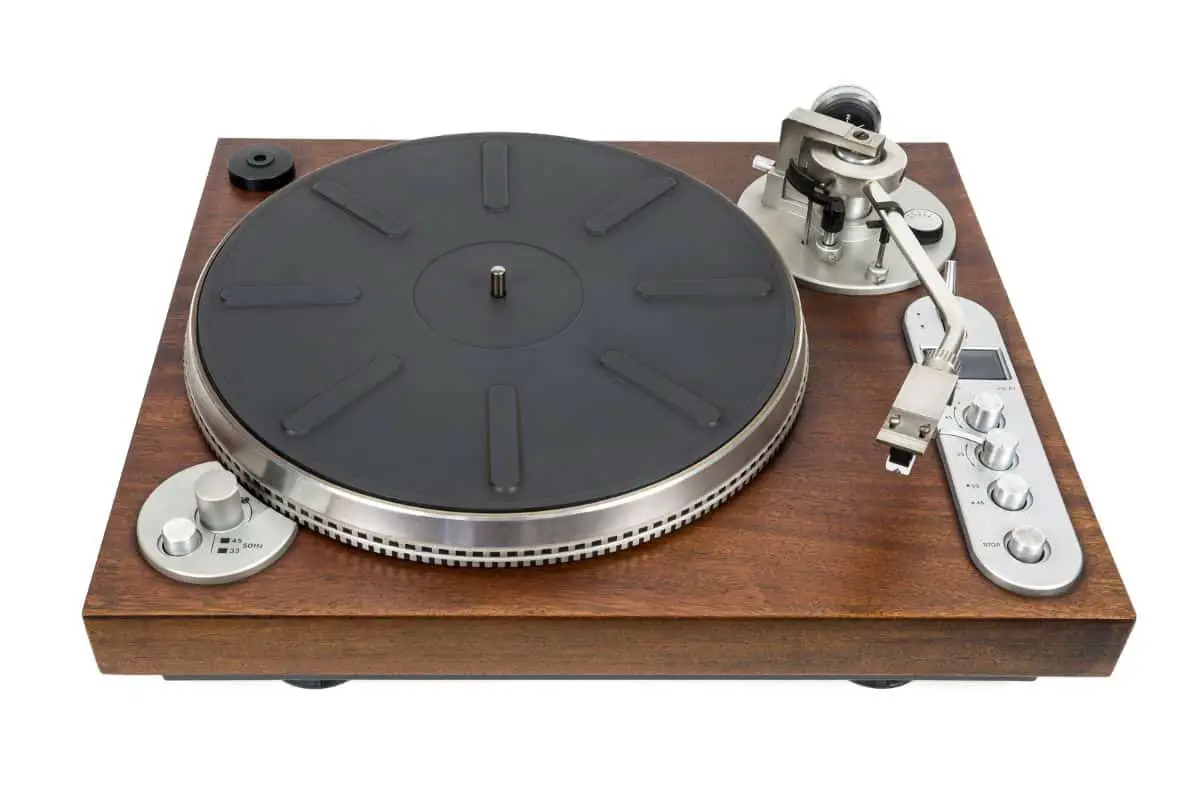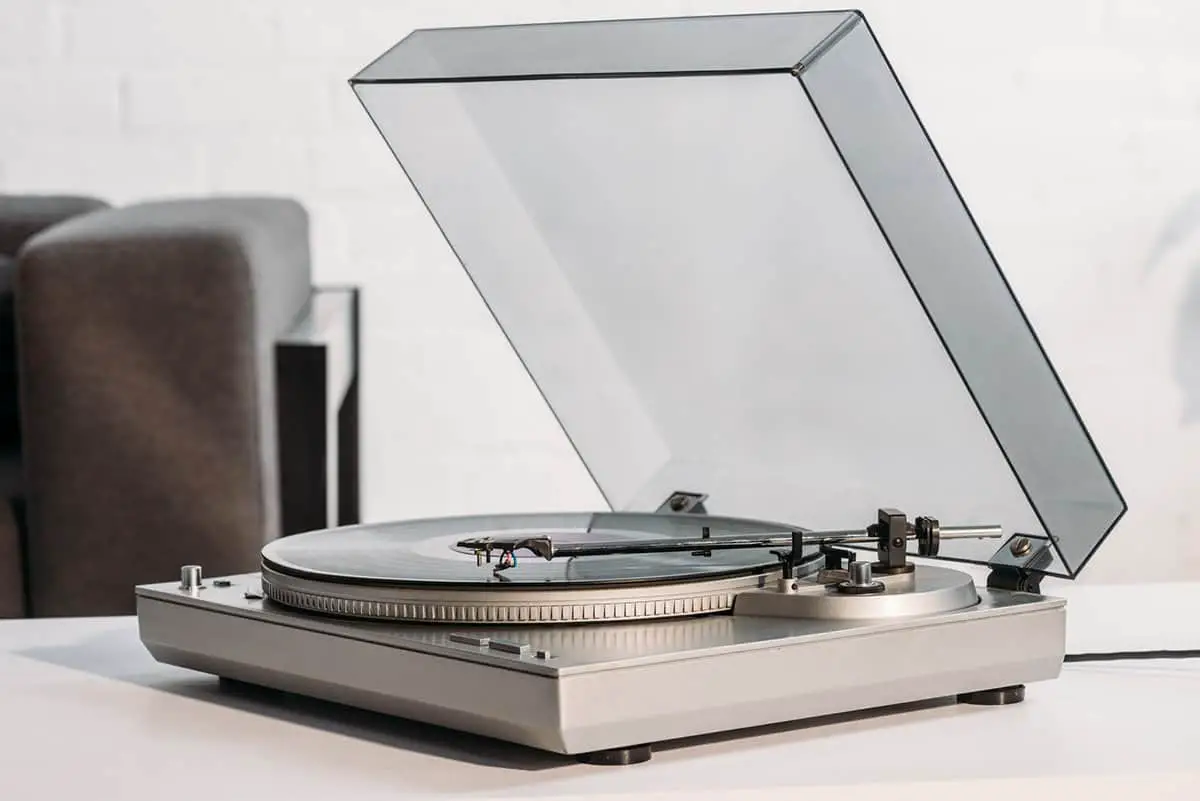This post contains affiliate links.
The past few years have seen the so-called “vinyl revival.” With the resurgence of vinyl records, budget-friendly turntables also proliferate. But how do these cheap turntables differ from high-quality, expensive ones?
Inexpensive turntables will destroy your records. They lack a counterweight to balance the tonearm, causing its weight to rest on the record. Your vinyl record will also hang on these undersized, cheap turntables, so it bends and flexes while spinning.
There are a lot more reasons why budget-friendly turntables can damage your records. That said, it is essential that you know what to look for when buying a turntable.
Table of Contents
Why Cheap Turntables Can Damage Your Records
Back then, the only place where people can purchase a turntable was a high-end audio shop and online stores. But since vinyl records became popular again, manufacturers began to produce turntables catered to those who are on a tight budget.

Right now, there is a lot of cheap record players in the markets. However, these turntables have low-quality parts, making them bad for your vinyl record.
Here are the reasons why cheap turntables can cause damage to your vinyl records:
- Cheap Turntables Do Not Have A Counterweight
A counterweight is a part of a record player that works to balance out the tonearm. This way, all of the cartridge tonearm’s weight will not rest on the record itself.
Additionally, turntables should have a tracking weight — the weight at which the tonearm rests on the record. A turntable’s tracking weight should be from one to two grams. The tracking weight is also adjustable to balance the tonearm if you add a new cartridge.
A correctly set counterweight will allow modern records to survive even after hundreds of plays. However, cheap turntables do not have a counterweight. Instead, they only use a piece of plastic to hold and balance the tonearm.
Since there is no counterweight, low-quality turntables will grind away your vinyl records twice or trice the right tracking weight. So, after approximately ten plays, your record will begin to deteriorate.
- Wrong Stylus Size
Cheap turntable styli are too large for modern 33rpm records. They are also too small for old 78rpm records. Still, manufacturers opted for such a stylus to save cost and make the final product’s market price affordable.
If you do not want your turntable to ruin your records, you need to ensure that you are getting one with two different styles. This way, you will be able to play both 33rpm and 78rpm vinyl records.
A lot of good turntables do not even have a 78rpm speed. The reason is that you need to make many changes to play the old format properly. The large stylus will cause the turntable to skip over your record’s groove, leading to scratches.
- Lack Of Anti-shake Feature
Turntables with an anti-shake feature prevent the arm from going to the center or out of the record. If the arm tries to move in and out of a playing record, it damages one side of the groove.
If your turntable does not have an anti-shake feature, the arm will grind away your record. Anti-shake works by keeping the stylus at the center of the group. As a result, it maximizes the quality of sound and minimizes the damage to the vinyl record.
- Undersized Platter
Some cheap turntables are too small, causing the record to hang off of it. Since the tonearm is tracking extensively against the other side of the vinyl record, it causes it to flex and bend while spinning. Such a factor results in lousy sound quality and damage to the groove of the record.
- Built-in Speakers
Turntables amplify the vibrations that the stylus makes while it is running on the vinyl record. Some cheap turntables have built-in speakers that work by making vibrations. The vibrations cause the record player to skip, resulting in terrible audio quality and damage to your record.
What Makes An Excellent Record Player?
There are many turntables in the market. So picking the best one can be a difficult task. If you do not know the features you need for a record player, you might get the wrong one.
But one thing worth noting about turntables is that they can be expensive. At first, spending more than $1,000 for a record player can sound ludicrous. But considering the features that you can get for this price, you are definitely getting what you paid for.
On the other hand, buying a cheap turntable is not only a waste of money but is also a way of putting your vinyl record at risk.
For that reason, make sure that you know the features that your record player needs to have.
Sufficient Extraction
A good turntable should be able to extract as much information out of the grooves as possible. You may expect your record player to extract all the information from the record groove, onto the stylus, and into the cartridge, without distortion or interference. However, that is impossible in reality.
That said, you need to get the most stable turntable possible for your vinyl record.
Good Motors And Belts
It is inevitable for motors to produce vibration. But high-quality turntables can minimize their degree of vibration. They do such by utilizing a belt drive.
Moreover, a belt drive also acts as a driver for the platter apart from working as a shock absorber for the motor’s vibration.
Vibration Reduction
There are different factors responsible for making a record player produce excellent sound:
- Proper stylus size
- Counterweight
- Vibration reduction
While we cannot argue that these three factors are essential, turntable engineers have a primary goal of reducing the most amount of vibration that they can.
As a result, the only vibration that high-quality record players have comes from the record groove that moves around the stylus. Such is the reason why expensive turntables sound a lot better than cheap ones.
Perfect Plinth
The plinth is basically the body of the turntable. This part comes in a variety of materials and shapes. If you want the best turntable in terms of isolating vibration, a double plinth is an ideal choice.
Moreover, the different materials used for making the plinth can significantly affect the sound. The reason is that different materials mean different resonation, frequencies, and how fast or slow vibration passes through them.
In addition, the feet where the plinth sits play a factor. The feet can aid in controlling resonance. It can also dampen the vibration coming from the cabinet that your turntable is sitting on.
The plinth also encases the main bearing that the spindle turns on.
With all that’s said, you should look for a plinth that perfectly isolates vibration and improves resonation.
Good Platter Design
Turntable engineers often use heavy materials to produce heavy platters. This way, the platter will be less prone to being disturbed by vibration. Apart from that, it will also have inertia on its side.
Heavy platter generally rotates to a speed that you set without it being too fast or too slow. On the other hand, lightweight platters tend to slow down pretty quickly.
Moreover, some turntables feature a platter mat. This mat helps in reducing vibrations. It is essential to have something for vibration control so that it will not pass up into the record and reduce the sound quality produced.
Furthermore, high-quality turntables have a platter and plinth designed to negate the need for a platter mat.
Sources
- Stephen Nelson-Smith, Just Say No! Why Cheap Turntables Destroy Your Records, Audio Advent, https://audio-advent.ghost.io/why-cheap-turntables-destroy-your-records/ July 27, 2021.
- Will A Cheap Turntable Damage Your Records?, Audio Appraisal, https://www.audioappraisal.com/will-a-cheap-turntable-damage-your-records/ July 27, 2021.
- AJ Powell, Why Pay $1,000 for a Turntable?, Gear Patrol, https://www.gearpatrol.com/tech/a264002/how-a-good-turntable-works/ July 27, 2021.
VacationVinyl.com is a participant in the Amazon Services LLC Associates Program, an affiliate advertising program designed to provide a means for sites to earn advertising fees by advertising and linking to Amazon.com. We also participate in other affiliate programs which compensate us for referring traffic.




